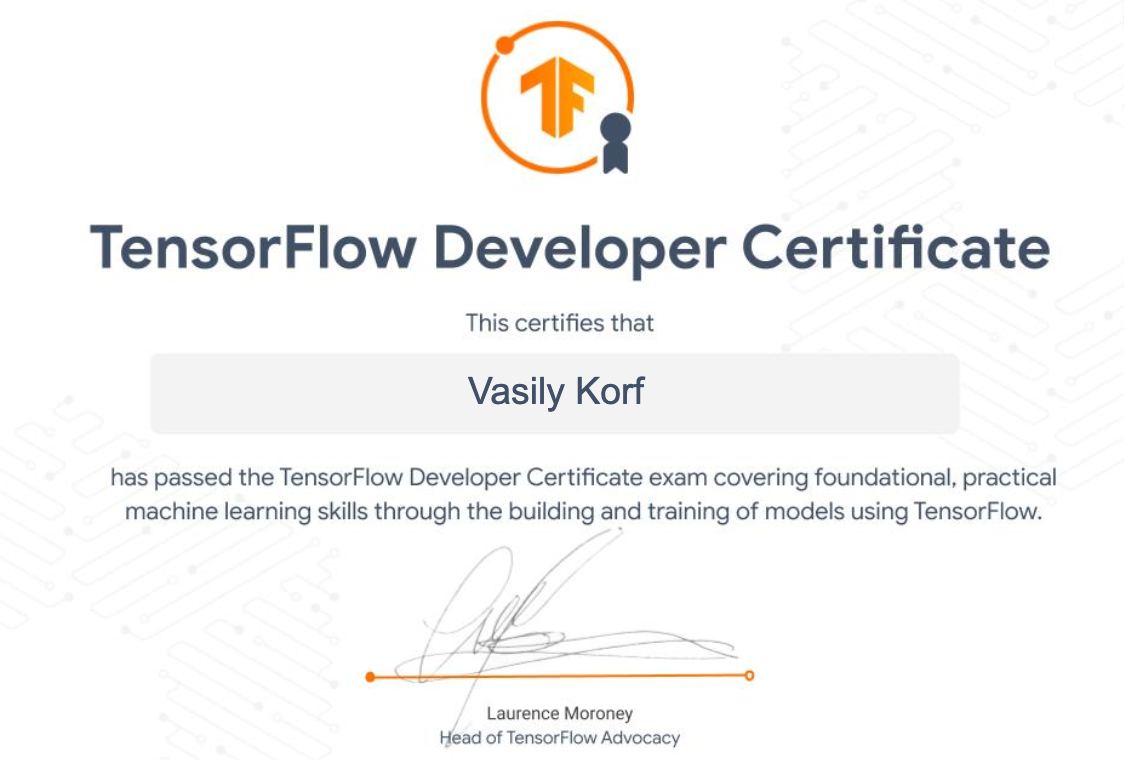It is said that the certificate is an official validation confirming your proficiency with TensorFlow with respect to solving deep learning and ML problems in the AI-driven job market. How accurate is this?
Does it make sense to have Tensorflow or any IT certification?
Frankly, not at all. In my view certifications are not worth it ($100 for TF certificate) and do not show up your ability. Also, I'm a bit skeptical about vendor-based certification, it is basically a money grabber or advertisement of technology. You won’t get a wage increase, promotion, or job offer right after.
There are some features that separate the TF exam from others though. Some of the advantages are:
- The format of the exam is groovy, nonlinear, and worth preparing for. You’ll be writing your code in IDE and submit your model for evaluation with the TF plugin.
- Each model covers a specific topic – a good way to organize your knowledge which you can apply in the industry.
- Tensorflow framework is trending. The exam helps you to learn basic concepts and be comfortable with the framework.
- Feeling of completion – pleasant extra.
Exam structure – 5 hours, 5 models
In short, you need to develop five models within five hours:
- Basic TensorFlow developer skills – create and save a simple neural network, know how to debug.
- Machine learning (ML) and deep learning (DL) foundation – build, train, and tune model, apply callbacks, deal with different data.
- Image classification problem – image recognition, object detection, CNNs, image augmentation.
- Natural Language Processing (NLP) – binary, multi-class categorization, embeddings, LSTMs, RNNs, GRU layers, CNNs.
- Time series forecasting – data preparation (trailing and centered windows), metrics understanding, learning rate adjustments, RNNs, CNNs.
Check the official exam page and Candidate Handbook.
Hints and advice
- Focus on the Tensorflow framework. You don’t need common packages like scikit-learn or Pandas for this exam.
- Learn how to use official documentation. You’ll be creating models, therefore, think about TensorFlow datasets, data preparation, input-, output-related methods. Spend some time understanding the structure of TF objects.
- Know the ways to tune, tweak, and monitor your TF models.
- Switch from Jupyter or Colab to IDE. Be familiar with your environment and test it, in the case of this exam, it’s PyCharm, Tensorflow certification plugin bundle, and specific packages. Follow this official guide to setup your environment properly.
- If you are new to PyCharm, learn how to use it efficiently, this can save you time during the examination. This minimum knowledge set includes hotkeys to run and modify scripts, debugger, and usage of scientific mode.
- Log your learning progress. Dates of completed courses/books/projects could well be enough.

Resources to prepare yourself for TF exam
If you have experience in developing models in TensorFlow, the exam should be relatively easy for you.
Basis
Laurence Moroney leads AI Advocacy at Google and he is the ideologist of this exam and the co-author of the related courses: “DeepLearning.AI TensorFlow Developer Professional Certificate” (the former name of this course is Tensorflow in Practice Specialisation). This specialization consists of four courses that cover almost everything you’ll need to pass the exam. Also, you can audit these courses for free. Coursera changed UI/UX, so it might be tricky to find this option. All you need is to visit one of the courses from specialization, for instance, Introduction to TensorFlow for AI, ML, select Syllabus section, and audit the content.
Again, If you have been working in the data-related field and have prior Python and TensorFlow experience, just go across the abovementioned course and you’ll be good, otherwise, you have to spend more time on preparation. Specifically, I suggest creating a simple project from scratch for each of the exam models respectively: basic CNN, Image recognition, NLP, Time Series.
Optional Courses
- Udacity – Intro to TensorFlow for Deep Learning (notebooks)
- Coursera – Deep Learning Specialization
- Google – Machine Learning Crash
Books
- Hands-on Machine Learning with Scikit-Learn and TensorFlow, but be careful to buy the most recent edition (Tensorflow 2).
- Deep Learning with Python
- The Hundred-Page Machine Learning Book
Good luck with that!

As usual, shoot a comment below if you're in need of a general TensorFlow cookbook or if you have any questions.

